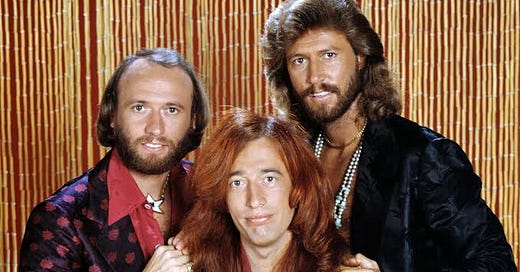It was 1977. “Saturday Night Fever” had been shot and edited but not released. The costly delay was due to a recalcitrant Columbia Records, who refused to license Boz Scagg’s hit “Lowdown” for the critical dance studio rehearsal scene, as Columbia Pictures had their own disco movie (which was never made) in the works.
The producers made contingency plans, including commissioning a rising Australian group of songwriting brothers. In fact, the only information the producers gave the Brothers Gibb was that the movie was “about a guy in New York who likes to dance.”
The Bee Gees’ “More Than a Woman,” sung by Tavares, replaced “Lowdown.” As below, both the Tavares and Bee Gees versions were included in the final cut of film. Each interpretation works in their separate cinematic contexts; the Tavares version was released as a single (#32 in 1978).
Although hugely successful, “Saturday Night Fever” placed the Bee Gees firmly into the “disco” category which, for reasons I offer here, was unfairly tainted by non-musical influences such as homophobia and right-wing politics.
The Bees Gees never got the critical respect they deserved. History may be catching up, however, as reflected by a recent Bee Gees documentary “How Can You Mend a Broken Heart.”
The Bee Gees have a remarkable discography recorded over a period of several decades. In the musical world, Barry Gibbs is respected as a songwriter and performer; the Bee Gees’ complex vocal harmonies are fairly compared to the Beatles and The Beach Boys.
To illustrate, I offer their performance of “Nights on Broadway” on “The Midnight Special,” 1975. Listen for the intense, rhythmic groove (108 bpm) and a key modulation (from D minor to F Major) which support a remarkable vocal performance.




Damn straight: "Jimmy Fallon is a fan, and “Nights on Broadway” provided inspiration for the “Barry Gibb Talk Show,” last time SNL’s played-out, weak brew of talk show and game show parodies was even marginally funny."